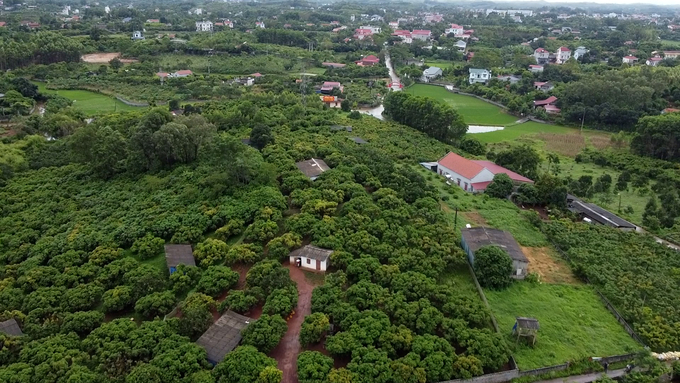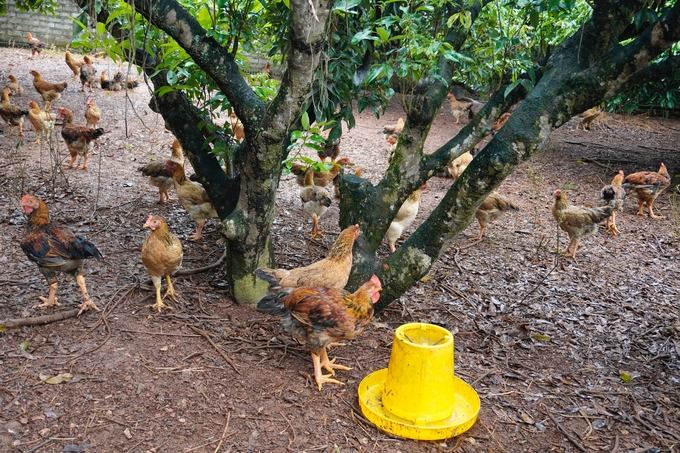There is not much room to increase the number of poultry in Yen The, currently to develop we must focus on quality, but there are still many obstacles.
Yen The is a mountainous district of Bac Giang province, with an area of over 303km2, a population of over 100,000 people with 14 ethnic groups living together. This place is not only famous for its traditional cultural values but also known for many famous specialties with high brand value, especially Yen The hill chicken.
The Yen The hill chicken farming model includes two main breeds: Ri lai and Mia lai. These are chicken breeds with beautiful appearance, delicious meat quality, raised under the canopy of forest trees and fruit trees according to biosafety procedures.
 Yen The District (Bac Giang) has natural, ecological and soil conditions that are very favorable for developing hill chicken farming. Photo: Hong Tham.
Yen The District (Bac Giang) has natural, ecological and soil conditions that are very favorable for developing hill chicken farming. Photo: Hong Tham.
Currently, Yen The district has formed concentrated hill chicken farming areas in communes such as Dong Tam, Dong Ky, Canh Nau, Tien Thang, Tam Hiep, Tam Tien, etc. with nearly 4,000 households regularly raising chickens. With a stable total flock of 4 – 4.5 million chickens, Yen The district annually sells over 14 million commercial hill chickens to the market with an average value of 1,300 – 1,500 billion VND.
Assessing the advantages in developing Yen The hill chicken farming, Mr. Giap Quy Cuong, Chairman of the Board of Directors and Director of Yen The Green Agriculture Cooperative, said that favorable natural, ecological and soil conditions give Yen The an advantage in developing a diverse agricultural sector with many hill garden and forest garden economic models associated with livestock development, especially chicken farming.
Furthermore, people in Yen The district have had a long experience in raising free-range chickens, and over time have developed appropriate chicken raising processes.
“Raising chickens on the hills of Yen The has formed a large area. People consider it a profession, one person follows another, one household looks at another, self-awareness and together advise each other on how to care for and raise the chickens to develop best”, said Mr. Cuong.
Chickens in Yen The are being strongly developed by local people, but besides the economic benefits, according to Mr. Cuong, there are still challenges and potential risks of unsustainability such as: People do not pay attention to the breeding process, the cages are not guaranteed. The source of locally produced breeds is scarce, many households have to buy breeds from outside for production but the quality of the breeds as well as diseases are not strictly controlled, etc.
Sharing the same view, Mr. Dao Xuan Vinh, Director of Bac Giang Agricultural Extension Center, said that Bac Giang is very interested in developing Yen The hill chickens, and has had many policies, projects, programs, and plans to promote development in recent years.
In addition, in terms of terrain conditions, Yen The has a large area, with lychee gardens and forestry gardens, which are very favorable for raising chickens.
In addition, current technical advances are also very rich, very favorable for farmers to absorb and apply in raising livestock. Feed, vaccines, veterinary medicines, etc. are also very favorable, diverse in types and readily available on the market.

However, in addition to the advantages and potentials, the development of Yen The hill chickens also faces many difficulties. According to Mr. Vinh, although the total flock of chickens in Yen The is quite large, the scale of chicken farming in Yen The is still mainly small, with rudimentary barns, making it difficult to apply technological advances.
Second, although Yen The hill chickens have not yet been infected with any disease, there is a very high risk of disease, such as Newcastle disease or avian influenza.
Third, the current price of animal feed is still high and unstable because most of the raw materials for feed production still depend on imports.
“There is not much room to increase the number of Yen The poultry flocks, so to develop, we must focus on quality to meet domestic consumption needs, as well as export”, Mr. Vinh emphasized.
These are issues that require the local government and breeders to pay attention and resolve together, so that Yen The hill chicken products are increasingly present in many domestic and international markets.
Hong Tham
Vietnam Agriculture Newspaper
